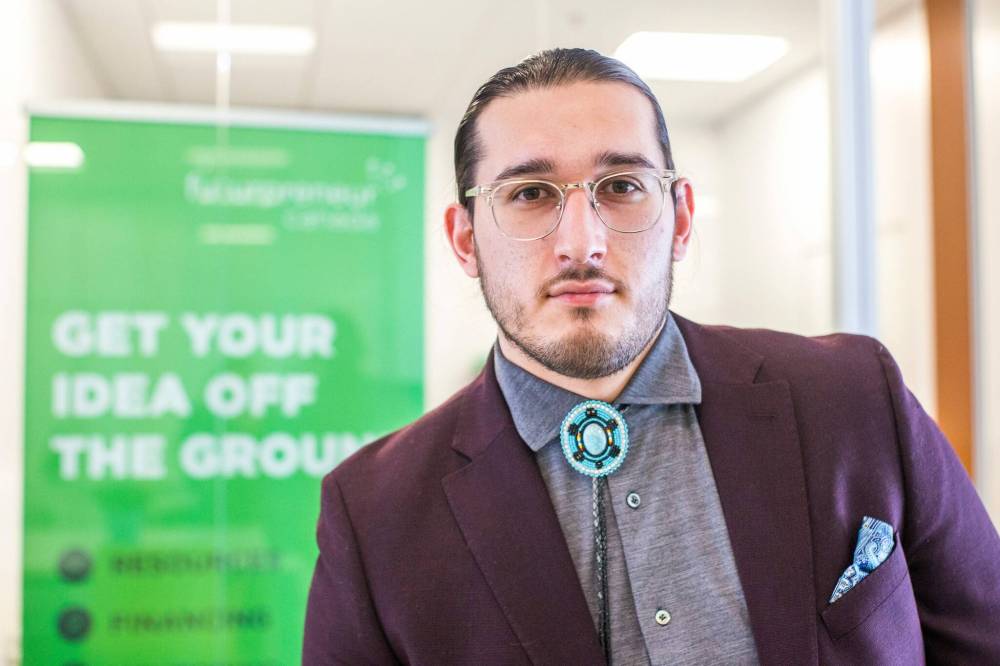Reconciliation a long-term business
Helping young Indigenous entrepreneurs create economic opportunities
Advertisement
Read this article for free:
or
Already have an account? Log in here »
To continue reading, please subscribe:
Monthly Digital Subscription
$0 for the first 4 weeks*
- Enjoy unlimited reading on winnipegfreepress.com
- Read the E-Edition, our digital replica newspaper
- Access News Break, our award-winning app
- Play interactive puzzles
*No charge for 4 weeks then price increases to the regular rate of $19.00 plus GST every four weeks. Offer available to new and qualified returning subscribers only. Cancel any time.
Monthly Digital Subscription
$4.75/week*
- Enjoy unlimited reading on winnipegfreepress.com
- Read the E-Edition, our digital replica newspaper
- Access News Break, our award-winning app
- Play interactive puzzles
*Billed as $19 plus GST every four weeks. Cancel any time.
To continue reading, please subscribe:
Add Free Press access to your Brandon Sun subscription for only an additional
$1 for the first 4 weeks*
*Your next subscription payment will increase by $1.00 and you will be charged $16.99 plus GST for four weeks. After four weeks, your payment will increase to $23.99 plus GST every four weeks.
Read unlimited articles for free today:
or
Already have an account? Log in here »
Hey there, time traveller!
This article was published 20/12/2021 (1449 days ago), so information in it may no longer be current.
As with anyone else, some Indigenous youth will have a smoother time bringing start-up dreams to reality than others. At a systemic level, however, barriers might make it harder for all these young business people than their non-Indigenous peers.
Noah Wilson serves as the business development manager for Indigenous young entrepreneurs at Futurpreneur Canada, a national non-profit that has launched 15,000 small businesses since its inception. Wilson’s goal is to get Indigenous youth from 18 to 39 where they need to be to build their self-made business — be it helping them craft a plan, providing access to cash flow or providing mentorship.
“We’re essentially one of the first lenders to support new entrepreneurs who may not have the background networks or finances or financial capability to go to a more traditional lender,” he told the Free Press.

Wilson, who is from Peguis First Nation but lives in Winnipeg, paints a picture. Maybe a young Indigenous adult made a mistake years ago and ended up facing criminal charges. No matter how small the incident, the charge and sentence is affected by a justice system in which Indigenous people are over-represented. Systemic barriers worsen — it’s harder to get employed, and business aspirations such as getting a loan or accessing financing can be nearly impossible without a pardon.
“I ask people, what other option do our Indigenous youth have, if they don’t have the ability to access the labour market? And if they don’t have the ability to get business loans to start their own business? What is the alternative? Because I would like to know,” he said.
“It’s pretty easy to understand how the cycle works, if that’s the system that our youth are operating in.”
This is where economic reconciliation comes into place. Wilson, who advises on the concept as the co-chair of the Winnipeg Chamber of Commerce’s Truth and Reconciliation Advisory Council along with fellow chair Jessica Dumas, explains it as an opportunity to take Canada’s history as context for how businesses move forward today.
“At the end of the day, Indigenous peoples, and our history of trading with settlers and other nations, it really comes down to that being representative of our relationship with those nations,” Wilson said.
“So ultimately, economic reconciliation is really about building partnerships and relationships, and rebuilding the damaged relationships and the exploitation of Indigenous peoples across Canada, from an economic exploitation standpoint, to ensure that Indigenous peoples have a seat at the economic table.”
This can present itself in different ways — developing an Indigenous engagement strategy, building a culturally welcoming workplace by having Indigenous employees in building those strategies, and building partnerships with Indigenous-owned businesses.
These ideas are outlined in the Winnipeg Chamber of Commerce’s Truth and Reconciliation Roadmap.
The interest is there, Wilson said, but many business owners and employees don’t know how to start.
“It’s just the fear of not knowing how to do it that’s one of those barriers for the broader business community. And that’s completely understandable,” he said.
Chamber president Loren Remillard said the road map guides people who have done the baseline work of educating themselves on the Canadian history that makes economic reconciliation a mutually beneficial pursuit and are ready to take action.
“It is in our collective interest to support truth and reconciliation, and that recognition exists. Where businesses are at now is fundamentally how do we action that commitment in a meaningful, authentic way,” he said. “That means listening to Indigenous leaders and communities.

“It’s not about coming to the table with all the solutions. It really is a partnership.”
As of 2017, Statistics Canada reported that First Nations, Métis and Inuit people owned just 1.7 per cent of all small and medium-sized businesses in Canada.
On the other hand, those businesses appear better poised to flourish right now than their counterparts.
Businesses owned by Indigenous Canadians, surveyed by Statistics Canada on the impact of COVID-19 in the third quarter of 2021, said while they were more likely to face more obstacles in the coming year than other business owners, they were also more likely to expect higher profitability, selling price and demand than other private-sector businesses.
While one in seven of all private-sector businesses expected a decrease in sales in the third quarter, only one in 10 Indigenous-owned businesses did.
“I think we have made progress, but it’s a long-term journey.
“Indigenous leaders have spoken about seven generations of healing — this is not a short-term endeavour,” Remillard said.
“There’s been hundreds of years of history that collectively have shaped where we are today, it is going to take a long-term approach.”
malak.abas@freepress.mb.ca

Our newsroom depends on a growing audience of readers to power our journalism. If you are not a paid reader, please consider becoming a subscriber.
Our newsroom depends on its audience of readers to power our journalism. Thank you for your support.

